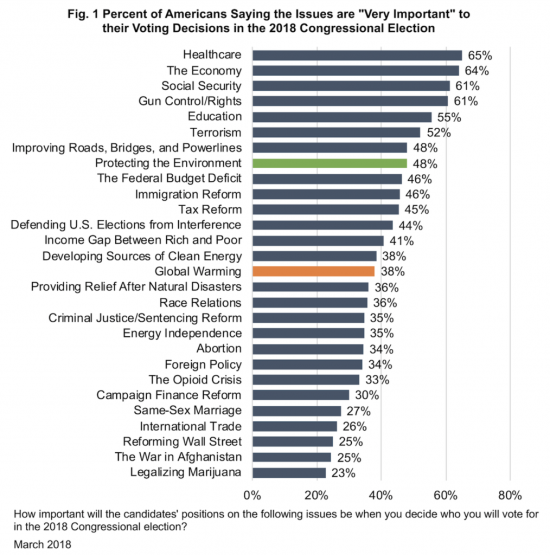April 21, 2019 – When politicians and the media ask in polls what are the chief concerns of the electorate in Canada and the United States, the threat of climate change never is in the top three. In Canada, the most recent Abacus polls put the economy first, drug addiction second, and climate change third. While in the United States Pew Research Center polls (see figure below) prior to the 2018 election put healthcare, the economy, and social security as top voter priorities with global warming ranked 15th in importance. That ranking position was considerably higher than in past polling and suggests that even in Trump America, the environment and climate change are seen, in the eyes of voters, as having some importance.
One could argue that protecting the environment, listed as number 8 in the priority rankings, could be combined with global warming, but in fact, is separate even though the former encompasses the latter issue as does developing sources of clean energy, ranked 14th. And then there are the two terms “climate change” and “global warming” of which the latter brings out a more emotive response than the former.
George Marshall, founder of the Climate Outreach Information Network, and author of “Don’t Even Think About It: Why Our Brains Are Wired to Ignore Climate Change,” states that the term “climate change” can mean almost anything you want it to be. It doesn’t have the immediacy of some of the other issues of the day even though it is perceived as imposing upon us an uncertain future. But the where, when, and how, remain confusing. The result is, for Americans a 15th ranking in voter priorities.
So why is it number three in Canada? The immediacy of the issue of climate change may be related to the actions of the national government in making the issue a central policy position. And maybe it is also because some of Canada’s provinces, British Columbia and Quebec notably, raised the profile of fighting climate change through market-based policy initiatives well before the federal government came on board.
But most of us, if we talk about climate change, tend to confine the conversations to immediate family, close friends, and maybe colleagues at work. For those who have been victims of extreme weather events – think drought, hurricanes, tornadoes, wildfires, and floods, there appears to be reticence in the face of climate or weather-related trauma. Instead, the conversations are about rebuilding rather than the causes behind the need to recover.
The science that informs us that climate change is human influenced is well documented. There are thousands of journal articles, studies, letters, and reports published in numerous peer-reviewed publications. For the public, it is a challenge to wade through all of this researched content. Even I, who read widely about climate change science, find the volume to be nearly overwhelming. But I look at all of this research and recognize that scientists are doing their jobs in alerting us repeatedly about the oncoming threat.
Marshall argues that our ability to mobilize against the threat of climate change includes both social and scientific facts. And right now it is the former, the social that explains the relative prioritization of the issue in the minds of the public. If even those who are perceived victims of anthropogenic climate change in the form of extreme weather events, cannot talk and act on it, then how can the rest of us be expected to act who have not yet felt its direct impact.
Enter the children, the young people of the planet, who are finding a voice in a teenager, Greta Thunberg, who at age 16 has started a movement to confront an indifferent society to the perils of a future where climate change will mean a life far different than what we have today. Thunberg began by skipping school to protest the older generation’s indifference in front of Sweden’s parliament buildings. Her vocal and visible efforts have spawned school children around the world to walk out of classrooms on Fridays in 125 countries in solidarity with her.
Recently Thunberg was invited to speak to the World Economic Forum in Davos, Switzerland, where she stated, “Solving the climate crisis is the greatest and most complex challenge that homo sapiens have ever faced….We have to stop the emission of greenhouse gases…Either we choose to go on as a civilization or we don’t.” Thunberg went on to talk about adults talking about climate change who often state, “We owe it to the young people to give them hope.” Thunberg’s rejoinder to that is “I don’t want your hope. I don’t want you to be hopeful. I want you to panic. I want you to feel the fear I feel every day. And then I want you to act…I want you to act as if the house is on fire because it is.”
Marshall’s arguments about the social aspect of climate change as being more relevant than the science is borne out by Thunberg’s very social argument, “We have the right to live our dreams and hopes…Adults are jeopardizing our future…You say you love your children above all else, and yet you are stealing their future in front of their very eyes.”
Thunberg is shaming the older generation. Her singular effort of personal protest has led to an emotional media response. The coverage of her efforts and those who are participating in walkouts may shape the narrative and discussion, and shape what happens to our planet going forward.
How can parents ignore their children’s fears about the future? How will it affect parents when they vote?

















